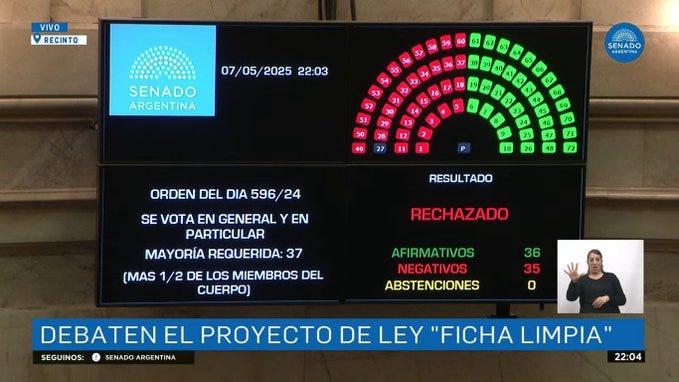On Wednesday, Argentine Senators rejected the “Fecha Limpia” (“Clean Record”) bill by one vote. The bill, which would have barred those convicted of corruption from running for national office, received 36 votes in favor and 35 against, one vote short of the 37 needed for an absolute majority.
The bill was widely seen as an attempt to prevent former President Cristina Fernández de Kirchner (CFK) from returning to public office. President Javier Milei, whose La Libertad Avanza (LLA) party was in favor of the bill, expressed his anger at the Senate outcome on social media, writing “Regrettable. The end,” alongside a graphic of voting distribution. Milei also called out members of the PRO–LLA’s legislative allies–for not all voting in favor of the bill.
It remains unclear whether CFK will run for office in the October midterm elections or in a future instance. She did not present herself as a candidate in the 2023 presidential elections.
(Infobae, MercoPress, Buenos Aires Times, X)
More Argentina
The Education Secretariat found that less than half of the children under nine years old are reading at the expected level, according to the Buenos Aires Times. 24.5% were “in the process” of reaching the expected level, while 30.5% were “significantly behind.”
President Javier Milei signed a new energy tariff agreement with Paraguay for the Yacyretá Hydroelectric Power Plant, which is co-owned by both countries, reports MercoPress. The agreement, which sets the tariff at $28 per megawatt-hour (MWh), will “optimize supply, ensure financial stability, and support technological modernization.”
El Salvador
In an interview, Vice President Félix Ulloa announced El Salvador would offer its services as a “prison for rent” for interested countries. In Private Wire Services, Joshua Collins assesses the international implications of such an offer, including what it means for El Salvador’s relationship with the U.S.
In Americas Quarterly, Douglas Farah argues that President Nayib Bukele will “continue to cut controversial deals with the Trump administration to protect his popularity,” as the country struggles to regain steady economic growth amid “Bitcoin gamble flounders” and a continued state of exception.
The Committee to Protect Journalists (CPJ) called for Salvadoran authorities to drop charges against El Faro journalists who revealed the ties between criminal gangs and the Bukele administration.
Brazil
A U.S. State Department request to designate two Brazilian criminal gangs as terrorist organizations was rejected by the Brazilian government, reports Reuters. The gangs, Primeiro Comando da Capital (PCC) and Comando Vermelho (CV), are suspected of having members in the United States.
According to the Guardian, Brazilian National Secretary of Public Security, Mario Sarrubo, claimed, “We don’t have terrorist organizations here, we have criminal organizations that have infiltrated society.”
Colombia
Ivan Nave, former Senate President, was arrested for allegedly receiving bribes from government officials to support President Gustavo Petro’s reform agenda, according to Colombia Reports.
Former Foreign Minister Alvaro Leyva published a second letter, directed to President Gustavo Petro, on social media citing several instances of Petro’s “embarrassing” behavior and alleging that current Former Minister Laura Sarabia was appointed to the role due to her knowledge of sensitive information.
Venezuela
Venezuelan Interior Minister Diosdado Cabello denied that five opposition members fled to the U.S. as part of a rescue operation, instead claiming that their departure had been part of negotiations with the government, reports AP News. (see 5/7 LADB for additional details)
Bolivia
In the Latin America Risk Report, James Bosworth analyzes the current presidential race in Bolivia, and offers four distinct interpretations of the recently-announced candidacy of Senate President Andrónico Rodríguez, in competition with former President Evo Morales and current President Luis Arce.
Morales is currently seeking to avoid arrest by hiding out in the Bolivian jungle, explains the Guardian. Police are unable to get to him without receiving permission from hundreds of coca farmers who guard the access route to the village where Morales is staying.
War on Drugs
InSight Crime published a roundup of the metric tons of cocaine that countries across Latin America and the Caribbean seized in 2024, based on national data. Colombia and Ecuador were at the top of the list, followed by Panama and Brazil.
Suriname
A CSIS commentary by Evan Ellis discusses why Suriname’s May 25 national elections are important for the region and the United States, given the country’s role as an emerging petroleum producer and mining hub.
Peru





